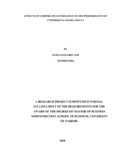| dc.description.abstract | The aim of the study was to determine the effect of corporate governance on performance
of Kenya commercial banks. Descriptive research design was used. A census targeting
Kenyan commercial bank for the year 2017 was conducted. The study used primary and
secondary data acquired from questionnaire and Central bank of Kenya annual bank
supervision report and respective commercial banks’ websites. Questionnaires were used
to measure three balanced scorecard perspectives; internal and customer business
perspective & innovation and learning. Also, corporate governance measures used in the
questionnaire include size of the board, board meetings frequency & board independence.
Bank size was used as the control variable. Statistical Package for Social Sciences (SPSS)
version 20 was used to analyze the collected data. Descriptive statistics was used to
describe the variables using mean and standard deviation. Regression analysis was used
to establish the effect of corporate governance on performance on Kenyan commercial
banks. Regression model showed that size of the board and board’s independence had
positive effect on performance and not statistically significant (β= 0.337 and 0.010
respectively, p-value ˃ 0.05). Board meetings frequency had a negative impact on
performance and not statistically significant (β= -0.301, p-value ˃ 0.05). The bank size
had a positive impact on performance and statistically significant (β= 0.134, p-value˂
0.05). Correlation analysis showed that size of the board and bank size had a positive
correlation and was statistically significant (β= 0.436, 0.46 respectively, p-value ˂ 0.05).
Independence of board had a positive correlation coefficient and not statistically
significant (β= 0.051 and p-value ˃ 0.05). Board meetings frequency had a negative
correlation coefficient and was not statistically significant (β= -0.094, p-value˃ 0.05).
The results of the analysis of variance (ANOVA) had F ratio of 3.481 with a level of
significance of 0.022, this shows that the effect of size of the board, board meetings
frequency, board independence and bank size was statistically significant. The adjusted
coefficient of determination R2 was used to evaluate the explanatory power of the
independent variables. Adjusted coefficient of determination for the regression was
25.5% indicating that the independent variable explained only 25.5% of the variation in
the dependent variable. The study concluded that the effect between corporate
governance and performance was positive. The limitation of this study was that it was
carried on only commercial banks in Kenya neglecting other financial institutions. This
study recommends that banks should monitor frequency of board meetings because it
appears to affect the performance of the banks negatively. Also, to broaden the board
size, promote bank size and increase number of outside directors. | en_US |



